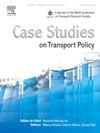Legislation review in reconstructing Indonesia’s hub ports policy
IF 2.4
Q3 TRANSPORTATION
引用次数: 0
Abstract
Indonesia possesses abundant maritime assets, including an extensive coastline and a strategic location along the world’s busiest shipping lanes. Despite these advantages and two decades of government policies (2001–2020) aimed at developing an International Hub Port (IHP), the country has yet to establish a port that meets the criteria necessary to accommodate the latest generation of vessels. This study adopts a qualitative approach, combining archival research, policy analysis, and expert interviews with top executives from Indonesia’s largest state-owned port company, providing diverse perspectives on Indonesia’s hub port development. Archival research examines regulatory shifts over time, while policy analysis and expert insights offer perspectives on logistical competitiveness and infrastructure readiness. The findings highlight the need to strengthen regulatory coherence, establish clear hub port criteria, ensure the continuity of priority programs, and enhance the overall preparedness of Indonesian ports for IHP status. Stakeholders emphasize that existing ports are not yet equipped to function as an international hub. Reducing Indonesia’s dependence on foreign transshipment hubs is crucial to enhancing its strategic role in global trade. Immediate collaboration among policymakers, industry leaders, and stakeholders is essential to drive the reconstruction of regulatory frameworks, accelerate port modernization, and ensure Indonesia’s readiness as a global hub.
印尼枢纽港政策重构中的立法审查
印度尼西亚拥有丰富的海上资产,包括广阔的海岸线和世界上最繁忙的航道沿线的战略位置。尽管有这些优势,而且政府制定了二十年(2001-2020年)旨在发展国际枢纽港(IHP)的政策,但该国尚未建立一个符合容纳最新一代船舶所需标准的港口。本研究采用定性方法,结合档案研究、政策分析和对印尼最大国有港口公司高管的专家访谈,为印尼枢纽港的发展提供了不同的视角。档案研究考察了随着时间推移的监管变化,而政策分析和专家见解则提供了物流竞争力和基础设施准备情况的观点。调查结果强调需要加强监管一致性,建立明确的枢纽港标准,确保优先规划的连续性,并加强印度尼西亚港口对国际卫生伙伴关系地位的总体准备。利益相关者强调,现有港口尚未具备作为国际枢纽的功能。减少印尼对外国转运枢纽的依赖,对于增强其在全球贸易中的战略作用至关重要。政策制定者、行业领袖和利益相关者之间的立即合作对于推动监管框架的重建、加快港口现代化、确保印尼做好成为全球枢纽的准备至关重要。
本文章由计算机程序翻译,如有差异,请以英文原文为准。
求助全文
约1分钟内获得全文
求助全文

 求助内容:
求助内容: 应助结果提醒方式:
应助结果提醒方式:


